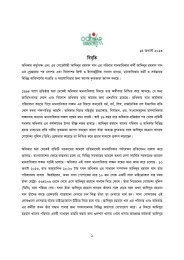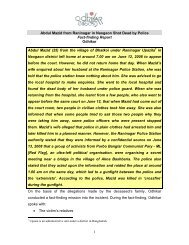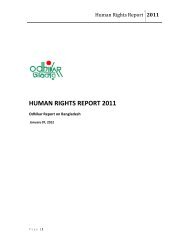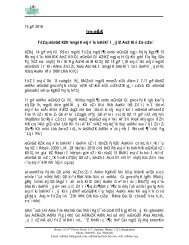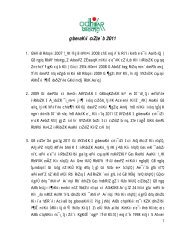Please - Odhikar
Please - Odhikar
Please - Odhikar
You also want an ePaper? Increase the reach of your titles
YUMPU automatically turns print PDFs into web optimized ePapers that Google loves.
Outcomes planned from the objectives<br />
� First hand detailed fact-finding report<br />
� Improvement in the behavior of police towards arrested persons.<br />
� Awareness raising and advocacy to initiate change and to highlight police abuse and<br />
create pressure groups to advocate for a better police system.<br />
During the first project year (2003), from the activities it carried out, especially from fact finding<br />
and police station monitoring missions, <strong>Odhikar</strong> learnt that although the police were violating<br />
human rights, there were extremely few cases where legal action had actually been taken against<br />
the police in this regard. Thus the police were enjoying a sort of impunity, despite violating<br />
human rights. While they should be held accountable and punished for such violations they<br />
remain out of reach from the ’long arm of the law’. For this reason, in 2003, the theme "Breaking<br />
the Chain of Impunity: Human Rights Intervention in South Asia" was chosen for a projectbased<br />
regional discussion meeting. The discussants and participants condemned the vicious<br />
circle of politics, crime and corruption, which makes ordinary people victims of police abuse.<br />
They condemned the fact that the denial of human rights creates conditions for social and<br />
political unrest, sowing the seeds of violence and conflict. Impunity in any form, is a violation<br />
of human rights as well as a direct threat to rule of law, which is a necessary basis of democracy.<br />
The participants agreed that victims did not resort to the court and offences perpetrated against<br />
them went unpunished because of several factors, including, in many cases, ignorance of law,<br />
poor economic condition of ordinary people and fear of reprisal. The participants from the other<br />
South Asian countries opined that impunity persisted in the region mainly due to government’s<br />
intention to cling to power for a long period of time, thus abusing state power. Absence of the<br />
independence of judiciary and virtually non-functioning parliaments were also identified as<br />
causes of impunity to human rights violations.<br />
The theme for the 2004 project-based regional discussion meeting was Criminal<br />
Responsibility for Torture: South Asian Perspective in which prominent human rights<br />
activists from South Asian countries spoke of having similar problems regarding abuses of<br />
power by law enforcement agencies, enabling them to commit torture and other crimes. <strong>Odhikar</strong><br />
felt that continued monitoring could bring to light the reasons behind inefficiencies, abuse and<br />
acts of human rights violation by law enforcement agencies so that a continued effort could be<br />
made to sensitize policymakers and responsible people in government of the problem.<br />
This year, 2005, the theme of the discussion program was Victim and Witness Protection<br />
Under the National Legal Regime: South Asian Perspective. One of the main findings of the<br />
<strong>Odhikar</strong> monitoring and fact finding component of the project, was that victims and witnesses<br />
continued to remain in an environment of insecurity and uncertainty even after they took<br />
recourse from the law. Thana monitoring showed that police were not very sympathetic or<br />
understanding towards victims and complainants had to wait for a minimum of an hour or more<br />
in order to lodge complaints - and that, too after ’paying’ the police. Research shows that the<br />
Report 2005<br />
9




